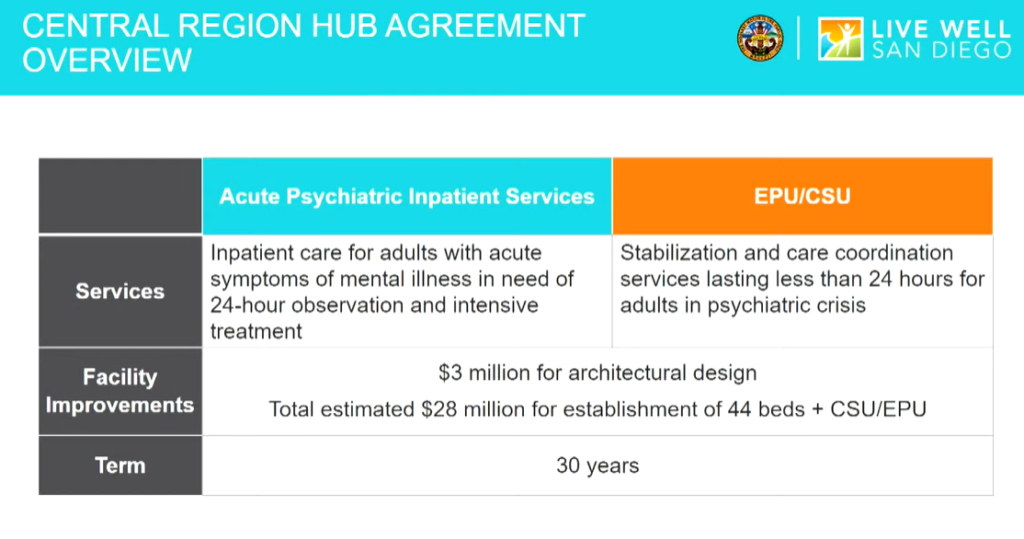BEHAVIORAL HEALTH HUB: Last week, the San Diego County Board of Supervisors unanimously approved a plan for a less-expensive behavioral health facility at Alvarado Hospital Medical Center. When it opens in late 2023, the Central Regional Behavioral Health Hub will feature 44 new acute inpatient beds and a crisis stabilization unit. The county is also looking at other opportunities to expand other continuum capacities at sites such as the Rosecrans and Parcel/Third Avenue psychiatric facilities. Under the plan, Alvarado Hospital is the license holder/operator; UCSD will provide medical direction, clinical oversight, and clinical training capacity; and the county will be the capital investor, staffer, and payer. Plans call for investing capital in the project with expectations that future capacity will increase to 60 beds total.

The discussion will be continued at future Board of Supervisors meetings. On Sept. 27, Luke Bergmann, PhD, behavioral health services director for San Diego County’s Health and Human Services Agency, will present an analysis of the urgent needs of different service areas (post-acute and long-term care). On Oct. 11, Dr. Bergmann will present a report on concrete action to expand capacity in identified areas.
GED ACCREDITATION: On the heels of last month’s press conference announcing that all eligible hospitals in San Diego County have achieved Geriatric Emergency Department accreditation, CHA has produced a video highlighting the significance of this milestone.
ICYMI — MEDICAL BASELINE CUSTOMERS: During times of extreme weather, California power companies recommend residents have a disaster preparedness plan in place in the event power must be shut off for safety reasons. Medical baseline programs enable patients who depend on power for certain medical conditions and independent living needs to lower energy rates and, most importantly, receive advance notice of public safety power shutoffs to their residences. With the dry and windy weather conditions forecast in the coming months, it is anticipated that power shutoffs will be top of mind for many of the most vulnerable patients. To assist hospitals, CHA — in partnership with Pacific Gas & Electric, San Diego Gas & Electric (SDGE), and Southern California Edison — has prepared this on-demand recording that explains medical baseline programs and details the support and resources available from the utility companies. While the programs are similar across power utilities, there are unique forms and processes for SDGE that can be accessed via the utility’s website. Additional resources are available from SDGE in English and Spanish to support patients during outages.
MONKEYPOX: The county of San Diego is urging health care professionals to stay up to date with this rapidly changing situation. Available resources include:
MEDI-CAL ENROLLMENT: To maintain continuity of coverage for all individuals — regardless of immigration status — who turn age 26 until the Medi-Cal expansion of people ages 26-49 (Senate Bill 184 ) takes effect on Jan. 1, 2024, the Department of Health Care Services (DHCS) will continue existing state-funded full-scope Medi-Cal coverage for this group, even after the COVID-19 public health emergency (PHE) ends. This will be done by instructing counties to deprioritize their annual redetermination after the end of the PHE and before the 26-49 expansion policy begins. DHCS has updated the Medi-Cal COVID-19 PHE Operational Unwinding Plan to reflect changes to the policy for this population.
